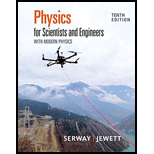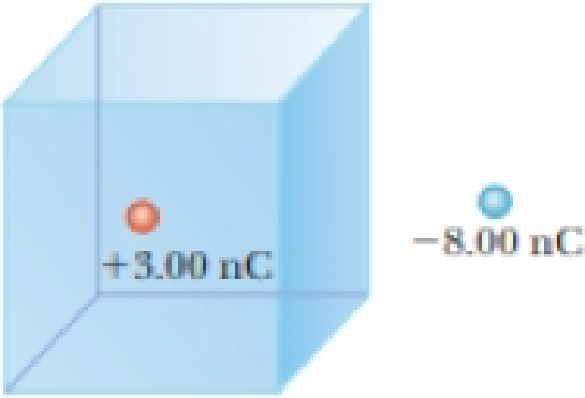
Physics for Scientists and Engineers with Modern Physics
10th Edition
ISBN: 9781337553292
Author: Raymond A. Serway, John W. Jewett
Publisher: Cengage Learning
expand_more
expand_more
format_list_bulleted
Concept explainers
Textbook Question
Chapter 23, Problem 17P
(a) Find the net electric flux through the cube shown in Figure P23.17. (b) Can you use Gauss’s law to find the electric field on the surface of this cube? Explain.
Figure P23.17

Expert Solution & Answer
Trending nowThis is a popular solution!

Students have asked these similar questions
Taking a Hike
A hiker begins a trip by first walking 21.0 km southeast from her car. She stops and sets up her tent for the night. On the second day, she walks 46.0 km in a direction 60.0° north of east, at which point she discovers a forest ranger's tower.
y (km)
Can
N
W-DE
45.0°
60.0°
Tent
Tower
B
x (km)
☹
(a) Determine the components of the hiker's displacement for each day.
SOLUTION
Conceptualize We conceptualize the problem by drawing a sketch as in the figure. If we denote the displacement vectors on the first and second days by A and B, respectively, and use the ---Select-- as the origin of coordinates, we obtain the vectors shown in the figure. The sketch allows us to estimate the resultant vector as shown.
Categorize Drawing the resultant R, we can now categorize this problem as one we've solved before: --Select-- of two vectors. You should now have a hint of the power of categorization in that many new problems are very similar to problems we have already solved if we are…
Plz plz no chatgpt pls will upvote .
You want to determine if a new material created for solar panels increases the amount of energy that can be captured . You have acquired 15 panels of different sizes manufactured with different materials including the new material.You decide to set up an experiment to solve this problem .What do you think are the 3 most important variables to address in your experience? How would you incorporate those materials in your experiment?
Chapter 23 Solutions
Physics for Scientists and Engineers with Modern Physics
Ch. 23.2 - Suppose a point charge is located at the center of...Ch. 23.3 - If the net flux through a gaussian surface is...Ch. 23 - A negatively charged rod of finite length carries...Ch. 23 - A positively charged disk has a uniform charge per...Ch. 23 - A uniformly charged ring of radius 10.0 cm has a...Ch. 23 - The electric field along the axis of a uniformly...Ch. 23 - Example 23.3 derives the exact expression for the...Ch. 23 - A uniformly charged rod of length L and total...Ch. 23 - A continuous line of charge lies along the x axis,...Ch. 23 - A thin rod of length and uniform charge per unit...
Ch. 23 - (a) Consider a uniformly charged, thin-walled,...Ch. 23 - A vertical electric field of magnitude 2.00 104...Ch. 23 - A flat surface of area 3.20 m2 is rotated in a...Ch. 23 - A nonuniform electric field is given by the...Ch. 23 - An uncharged, nonconducting, hollow sphere of...Ch. 23 - Find the net electric flux through the spherical...Ch. 23 - Four closed surfaces, S1 through S4 together with...Ch. 23 - A charge of 170 C is at the center of a cube of...Ch. 23 - (a) Find the net electric flux through the cube...Ch. 23 - A particle with charge of 12.0 C is placed at the...Ch. 23 - A particle with charge Q = 5.00 C is located at...Ch. 23 - Prob. 20PCh. 23 - Prob. 21PCh. 23 - Find the net electric flux through (a) the closed...Ch. 23 - Figure P23.23 represents the top view of a cubic...Ch. 23 - Determine the magnitude of the electric field at...Ch. 23 - Prob. 25PCh. 23 - Prob. 26PCh. 23 - A large, flat, horizontal sheet of charge has a...Ch. 23 - A nonconducting wall carries charge with a uniform...Ch. 23 - A uniformly charged, straight filament 7.00 m in...Ch. 23 - You are working on a laboratory device that...Ch. 23 - Consider a long, cylindrical charge distribution...Ch. 23 - Assume the magnitude of the electric field on each...Ch. 23 - A solid sphere of radius 40.0 cm has a total...Ch. 23 - A cylindrical shell of radius 7.00 cm and length...Ch. 23 - You are working for the summer at a research...Ch. 23 - You are working for the summer at a research...Ch. 23 - Find the electric flux through the plane surface...Ch. 23 - Prob. 38APCh. 23 - Prob. 39APCh. 23 - Show that the maximum magnitude Emax of the...Ch. 23 - A line of positive charge is formed into a...Ch. 23 - Prob. 42APCh. 23 - A sphere of radius R = 1.00 m surrounds a particle...Ch. 23 - A sphere of radius R surrounds a particle with...Ch. 23 - A slab of insulating material has a nonuniform...Ch. 23 - A sphere of radius 2a is made of a nonconducting...Ch. 23 - Prob. 47CPCh. 23 - Prob. 48CPCh. 23 - Review. A slab of insulating material (infinite in...Ch. 23 - Identical thin rods of length 2a carry equal...Ch. 23 - A solid insulating sphere of radius R has a...
Additional Science Textbook Solutions
Find more solutions based on key concepts
Separate the list P,F,V,,T,a,m,L,t, and V into intensive properties, extensive properties, and nonproperties.
Fundamentals Of Thermodynamics
Some people compare DNA to a blueprint stored in the office of a construction company. Explain how this analogy...
Biology: Concepts and Investigations
Some people consider Pasteur or Koch to be the Father of Microbiology, rather than Leeuwenhoek. Why might they ...
Microbiology with Diseases by Body System (5th Edition)
Calculate the lattice energy of CaCl2 using a Born-Haber cycle and data from Appendices F and L and Table 7.5. ...
Chemistry & Chemical Reactivity
1. Genetics affects many aspects of our lives. Identify three ways genetics affects your life or the life of a ...
Genetic Analysis: An Integrated Approach (3rd Edition)
Knowledge Booster
Learn more about
Need a deep-dive on the concept behind this application? Look no further. Learn more about this topic, physics and related others by exploring similar questions and additional content below.Similar questions
- 7. Are all scientific theories testable in the commonly understood sense? How does this make you feel? How should you proceed as a scientist or engineer with this understanding?arrow_forwardWhat is an an example of a hypothesis that sounds scientific but is notarrow_forwardWhat is an example of a scientific hypothesisarrow_forward
- Multiverse is called a theory. It has been proposed to account for the apparent and uncanny fine tuning of our own universe. The idea of the multiverse is that there are infinite, distinct universes out there - all with distinct laws of nature and natural constants - and we live in just one of them. Using the accepted definition of the universe being all that there is (matter, space and energy), would you say that multiverse is a scientific theory?arrow_forwardHow is a law usually different than a theoryarrow_forwardA 1.50 mLmL syringe has an inner diameter of 5.00 mmmm, a needle inner diameter of 0.270 mmmm, and a plunger pad diameter (where you place your finger) of 1.2 cmcm. A nurse uses the syringe to inject medicine into a patient whose blood pressure is 140/100. Part A What is the minimum force the nurse needs to apply to the syringe? Express your answer with the appropriate units. View Available Hint(s)for Part A Hint 1for Part A. How to approach the question The force the nurse applies to the syringe can be determined from the fluid pressure and the area of the plunger. The minimum force corresponds to the patient's lowest blood pressure. Use the following equality 760mmofHg=1atm=1.013×10^5Pa760mmofHg=1atm=1.013×10^5Pa.arrow_forward
- A 1.50 mLmL syringe has an inner diameter of 5.00 mmmm, a needle inner diameter of 0.270 mmmm, and a plunger pad diameter (where you place your finger) of 1.2 cmcm. A nurse uses the syringe to inject medicine into a patient whose blood pressure is 140/100. Part A What is the minimum force the nurse needs to apply to the syringe? Express your answer with the appropriate units. View Available Hint(s)for Part A Hint 1for Part A. How to approach the question The force the nurse applies to the syringe can be determined from the fluid pressure and the area of the plunger. The minimum force corresponds to the patient's lowest blood pressure. Use the following equality 760mmofHg=1atm=1.013×10^5Pa760mmofHg=1atm=1.013×10^5Pa.arrow_forwardIs a scientific theory supposed to just be someone's idea about somethingarrow_forwardwhat is the agenda of physicsarrow_forward
arrow_back_ios
SEE MORE QUESTIONS
arrow_forward_ios
Recommended textbooks for you
 Physics for Scientists and EngineersPhysicsISBN:9781337553278Author:Raymond A. Serway, John W. JewettPublisher:Cengage Learning
Physics for Scientists and EngineersPhysicsISBN:9781337553278Author:Raymond A. Serway, John W. JewettPublisher:Cengage Learning Physics for Scientists and Engineers with Modern ...PhysicsISBN:9781337553292Author:Raymond A. Serway, John W. JewettPublisher:Cengage Learning
Physics for Scientists and Engineers with Modern ...PhysicsISBN:9781337553292Author:Raymond A. Serway, John W. JewettPublisher:Cengage Learning Physics for Scientists and Engineers: Foundations...PhysicsISBN:9781133939146Author:Katz, Debora M.Publisher:Cengage Learning
Physics for Scientists and Engineers: Foundations...PhysicsISBN:9781133939146Author:Katz, Debora M.Publisher:Cengage Learning Principles of Physics: A Calculus-Based TextPhysicsISBN:9781133104261Author:Raymond A. Serway, John W. JewettPublisher:Cengage Learning
Principles of Physics: A Calculus-Based TextPhysicsISBN:9781133104261Author:Raymond A. Serway, John W. JewettPublisher:Cengage Learning Physics for Scientists and Engineers, Technology ...PhysicsISBN:9781305116399Author:Raymond A. Serway, John W. JewettPublisher:Cengage Learning
Physics for Scientists and Engineers, Technology ...PhysicsISBN:9781305116399Author:Raymond A. Serway, John W. JewettPublisher:Cengage Learning College PhysicsPhysicsISBN:9781285737027Author:Raymond A. Serway, Chris VuillePublisher:Cengage Learning
College PhysicsPhysicsISBN:9781285737027Author:Raymond A. Serway, Chris VuillePublisher:Cengage Learning

Physics for Scientists and Engineers
Physics
ISBN:9781337553278
Author:Raymond A. Serway, John W. Jewett
Publisher:Cengage Learning

Physics for Scientists and Engineers with Modern ...
Physics
ISBN:9781337553292
Author:Raymond A. Serway, John W. Jewett
Publisher:Cengage Learning

Physics for Scientists and Engineers: Foundations...
Physics
ISBN:9781133939146
Author:Katz, Debora M.
Publisher:Cengage Learning

Principles of Physics: A Calculus-Based Text
Physics
ISBN:9781133104261
Author:Raymond A. Serway, John W. Jewett
Publisher:Cengage Learning

Physics for Scientists and Engineers, Technology ...
Physics
ISBN:9781305116399
Author:Raymond A. Serway, John W. Jewett
Publisher:Cengage Learning

College Physics
Physics
ISBN:9781285737027
Author:Raymond A. Serway, Chris Vuille
Publisher:Cengage Learning
Electric Fields: Crash Course Physics #26; Author: CrashCourse;https://www.youtube.com/watch?v=mdulzEfQXDE;License: Standard YouTube License, CC-BY